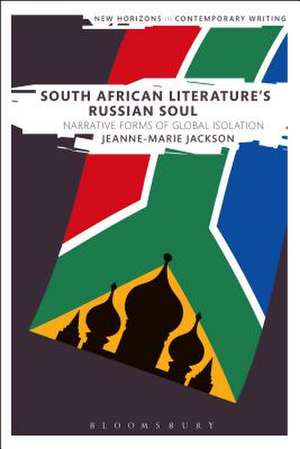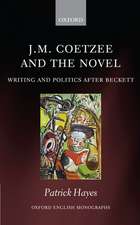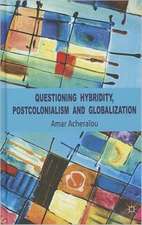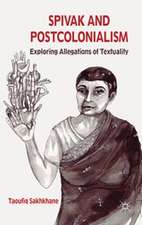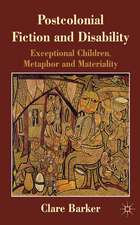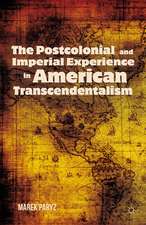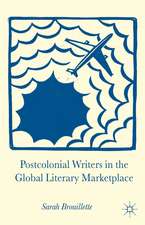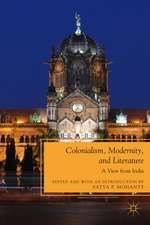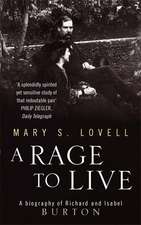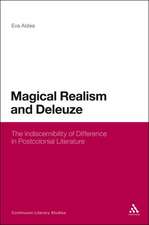South African Literature's Russian Soul: Narrative Forms of Global Isolation: New Horizons in Contemporary Writing
Autor Dr Jeanne-Marie Jacksonen Limba Engleză Hardback – 21 oct 2015
| Toate formatele și edițiile | Preț | Express |
|---|---|---|
| Paperback (1) | 257.21 lei 6-8 săpt. | |
| Bloomsbury Publishing – 19 apr 2017 | 257.21 lei 6-8 săpt. | |
| Hardback (1) | 715.34 lei 6-8 săpt. | |
| Bloomsbury Publishing – 21 oct 2015 | 715.34 lei 6-8 săpt. |
Din seria New Horizons in Contemporary Writing
- 23%
 Preț: 190.41 lei
Preț: 190.41 lei - 30%
 Preț: 510.60 lei
Preț: 510.60 lei - 30%
 Preț: 510.60 lei
Preț: 510.60 lei - 22%
 Preț: 256.77 lei
Preț: 256.77 lei - 22%
 Preț: 257.21 lei
Preț: 257.21 lei - 12%
 Preț: 259.90 lei
Preț: 259.90 lei - 22%
 Preț: 257.03 lei
Preț: 257.03 lei - 13%
 Preț: 257.59 lei
Preț: 257.59 lei - 22%
 Preț: 232.34 lei
Preț: 232.34 lei -
 Preț: 223.58 lei
Preț: 223.58 lei - 22%
 Preț: 224.58 lei
Preț: 224.58 lei - 22%
 Preț: 224.76 lei
Preț: 224.76 lei - 21%
 Preț: 217.17 lei
Preț: 217.17 lei - 21%
 Preț: 216.62 lei
Preț: 216.62 lei - 23%
 Preț: 197.52 lei
Preț: 197.52 lei - 23%
 Preț: 190.96 lei
Preț: 190.96 lei - 23%
 Preț: 192.64 lei
Preț: 192.64 lei - 23%
 Preț: 191.56 lei
Preț: 191.56 lei - 23%
 Preț: 191.67 lei
Preț: 191.67 lei -
 Preț: 190.68 lei
Preț: 190.68 lei - 30%
 Preț: 509.69 lei
Preț: 509.69 lei - 21%
 Preț: 541.71 lei
Preț: 541.71 lei - 30%
 Preț: 509.52 lei
Preț: 509.52 lei -
 Preț: 250.49 lei
Preț: 250.49 lei
Preț: 715.34 lei
Preț vechi: 1028.14 lei
-30% Nou
Puncte Express: 1073
Preț estimativ în valută:
136.88€ • 143.21$ • 113.71£
136.88€ • 143.21$ • 113.71£
Carte tipărită la comandă
Livrare economică 02-16 aprilie
Preluare comenzi: 021 569.72.76
Specificații
ISBN-13: 9781472592996
ISBN-10: 1472592999
Pagini: 248
Dimensiuni: 156 x 234 x 25 mm
Greutate: 0.52 kg
Editura: Bloomsbury Publishing
Colecția Bloomsbury Academic
Seria New Horizons in Contemporary Writing
Locul publicării:London, United Kingdom
ISBN-10: 1472592999
Pagini: 248
Dimensiuni: 156 x 234 x 25 mm
Greutate: 0.52 kg
Editura: Bloomsbury Publishing
Colecția Bloomsbury Academic
Seria New Horizons in Contemporary Writing
Locul publicării:London, United Kingdom
Caracteristici
The first extended comparative study of the enduring influence of 19th-Century Russian literature on contemporary South African writing
Notă biografică
Jeanne-Marie Jackson is Assistant Professor of World Anglophone literature at Johns Hopkins University, USA.
Cuprins
1. Introduction. Russia in the South African Imaginary 2. The Novel at a Crossroads: Gordimer, Tlali, & the Struggle for FormI. Testing Trans-Century Parallels II. Gordimer's Effacement by NarrationIII. The Path of Progress in Miriam Tlali's Amandla3. Making Animals Work in Tolstoy, Coetzee, and Van NiekerkI. Dismantling Tolstoy's StriderII. Coetzee's Action of AbsenceIII. Enduring Isolation in Marlene van Niekerk's Triomf 4. Retreating Reality: Chekhov's South African AfterlivesI. Structuring Chekhovian TimelessnessII. De Wet's Self-Disabling ResponseIII. The Risky Business of Canonical Affirmation 5. Émigré Fiction and the Double-Bind of HomeI. Permeable Repossessions and Nabokov's Speak, MemoryII. Mark Behr's Not-Quite-Global NovelIII. Nkosi's Mandela's Ego as Ambivalent Mourning 6. Epilogue. Works Cited Index
Recenzii
Jackson's South African Literature's Russian Soul: Narrative Forms of Global Isolation [is] well researched and well informed in the relevant scholarship areas for her study, be it Russian Literature, South African Literature, or Literary Theory on the novel from nineteenth-century realism to contemporary theories on the novel. Her ideas are lucidly expressed and corroborated with relevant textual evidence . Scholars in the related fields of African Literature, Russian Literature, Contemporary Literature, Comparative Literature, World Literature, Literary Theory, and Global Studies will find South African Literature's Russian Soul a valuable acquisition.
Jackson's comparisons are guided by a strong theoretical consciousness and a very thorough knowledge of the two fields ... Readers should ... savour for themselves the richness and complexity of the overall argument as well as the subtle and profound insights Jackson gleans from her juxtaposition of South African and Russian literature.
Jeanne-Marie Jackson's book examines the striking series of elective affinities between South African writers and their Russian precursors, from Tolstoy to Nabokov. Anyone with an interest in South African literature will want to read this book, not only for the questions of influence it deals with, but for the way it explores the manifold connections between the local and the global.
Jeanne-Marie Jackson's work breaks genuinely new ground in the study of the postcolonial novel-by reading the novels of apartheid-era South Africa not in relationship to Anglo-American literature, but by considering their relationship to the Russian realist novels of the nineteenth century. .[It] is often dazzling in its analytic precision, its heft, its depth of analysis.
In South African Literature's Russian Soul, Jeanne-Marie Jackson has written what is in many ways the most original and yet the most traditional study of this country's intellectual culture--original because it inspects and reworks the existing frameworks by which we understand the national and international dimensions of the written word, traditional because it does its conceptual work with the old-fashioned virtues of capacious historical learning and microscopic engagement with the details of language and imagination. It is the one book I'll recommend to writers as well as readers who are orienting themselves to this part of the world.
Jackson's comparisons are guided by a strong theoretical consciousness and a very thorough knowledge of the two fields ... Readers should ... savour for themselves the richness and complexity of the overall argument as well as the subtle and profound insights Jackson gleans from her juxtaposition of South African and Russian literature.
Jeanne-Marie Jackson's book examines the striking series of elective affinities between South African writers and their Russian precursors, from Tolstoy to Nabokov. Anyone with an interest in South African literature will want to read this book, not only for the questions of influence it deals with, but for the way it explores the manifold connections between the local and the global.
Jeanne-Marie Jackson's work breaks genuinely new ground in the study of the postcolonial novel-by reading the novels of apartheid-era South Africa not in relationship to Anglo-American literature, but by considering their relationship to the Russian realist novels of the nineteenth century. .[It] is often dazzling in its analytic precision, its heft, its depth of analysis.
In South African Literature's Russian Soul, Jeanne-Marie Jackson has written what is in many ways the most original and yet the most traditional study of this country's intellectual culture--original because it inspects and reworks the existing frameworks by which we understand the national and international dimensions of the written word, traditional because it does its conceptual work with the old-fashioned virtues of capacious historical learning and microscopic engagement with the details of language and imagination. It is the one book I'll recommend to writers as well as readers who are orienting themselves to this part of the world.
